© Gizmodo
Ahrefs or Semrush, which one to choose? Name a harder question – we’ll wait. Both SEO tools are extremely capable, offering bleeding-edge tools to boost your website ranking and online presence. We found that Semrush and Ahrefs are almost equally good.
Both excel at keyword research, backlink analysis, site audits, competitive analysis, and many other aspects. However, in this Ahrefs vs Semrush comparison, there can only be one winner. The winner will be the service that wins the most rounds in this battle.
To make it clear, our team of SEO experts has a long experience with both. This allows us to make an objective comparison and evaluate both options based on real-world use. Our honest thoughts about Semrush and Ahrefs are below, so stick around.
Ahrefs vs Semrush Keyword Research
Let’s start the duel with keyword research, the most prominent feature of SEO tools. If you’re working on improving the SEO of your website, keyword optimization is paramount. We tested Semrush and Ahrefs and must say they’re almost neck and neck.
Here are our observations.
Semrush
Semrush is a capable keyword research tool. Once you type in the key phrase, you’ll get information like search volume, difficulty, keyword suggestions, CPC, and a lot more. A huge advantage over Ahrefs is the search intent – this metric isn’t found in its rival.
Search intent tells you more about why people search for the keyword. The results are divided into transactional, navigational, informational, and commercial. Semrush also comes with data like trends, global volume, and the level of competition.
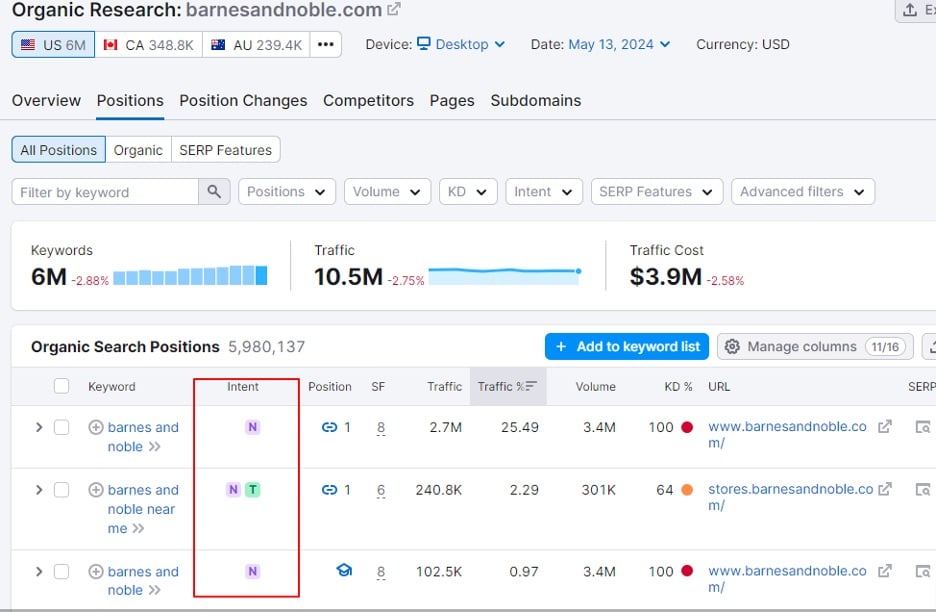 © Gizmodo.com
© Gizmodo.com
This is great when you’re thinking if it’s worth trying to rank for a specific term. A standout feature of Semrush is its Keyword Magic Tool. It’s easily our favorite option. This feature shows you hundreds of keyword suggestions that you can implement.
Visit Semrush
Moreover, it includes numerous filters to fully customize your search results. Apart from more than a few languages, Semrush also supports the word count filter. As a result, you can discover long-tail keywords with lower difficulty and competition – great for an easy SEO boost.
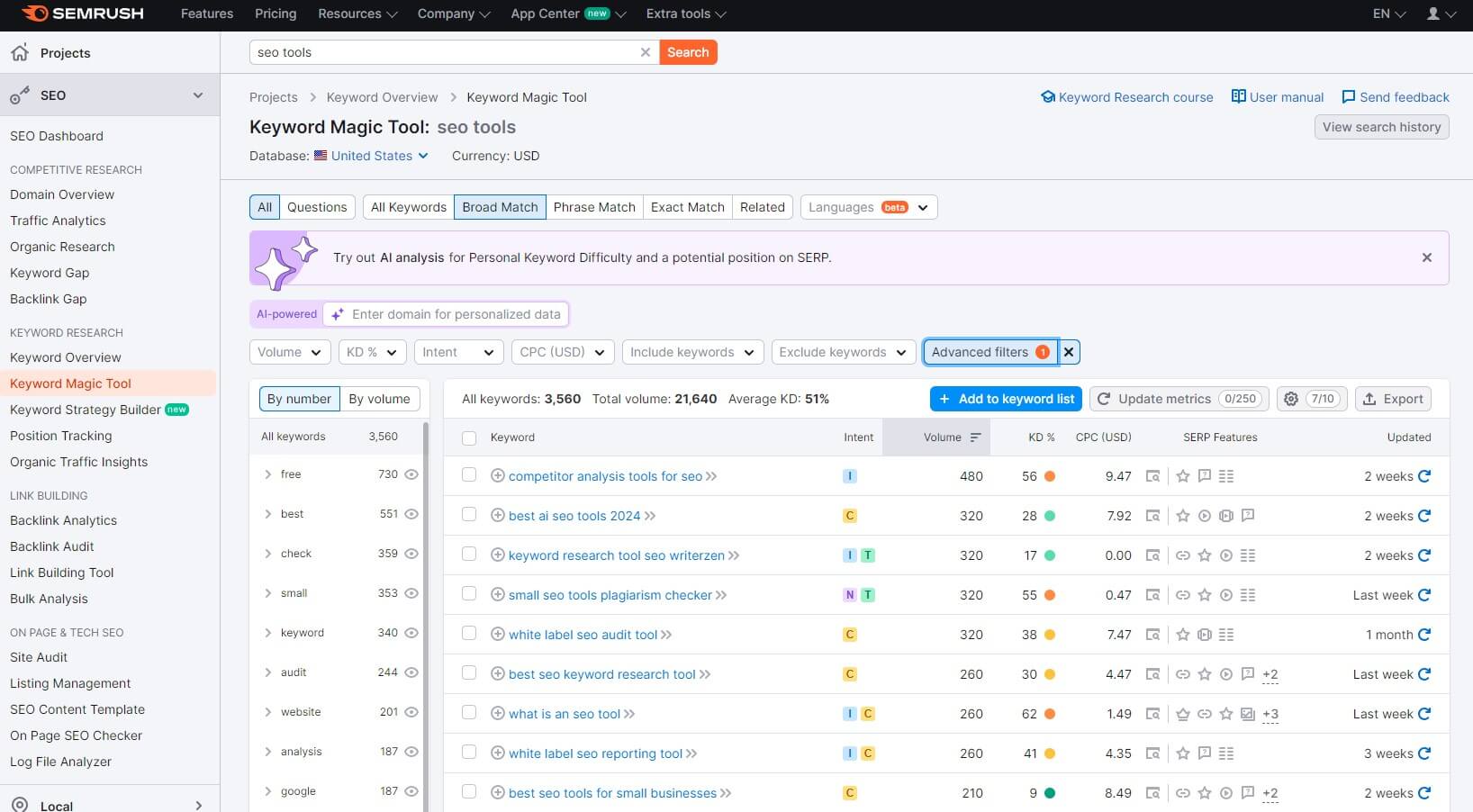 © Semrush
© Semrush
This tool also lets you find keyword-related questions. It’s suitable for FAQs or when you want to cover the topic more efficiently. We’ll also mention its Keyword Strategy Builder, a new tool that builds clusters of keywords based on a few seed keywords.
Finally, there’s the keyword gap tool that compares your keyword profile with competitors. You can compare your domain with up to 4 competitors and find their ranking keywords to try to overtake them for these terms. This is standard fare in premium SEO tools.
Ahrefs
Ahrefs has the Keyword Explorer tool that works similarly to Semrush. Once the term is provided, you’ll get keyword ideas, questions, and data like volume, difficulty, CPC, and so forth. Unlike Semrush, Ahrefs doesn’t come with the intent metric – a minus in our book.
Some say Ahrefs is more intuitive, with better information delivery. In our Ahrefs vs Semrush duel, we liked both but we still preferred the latter. However, the former has a few interesting metrics. For instance, you’ll see the number of clicks per search.
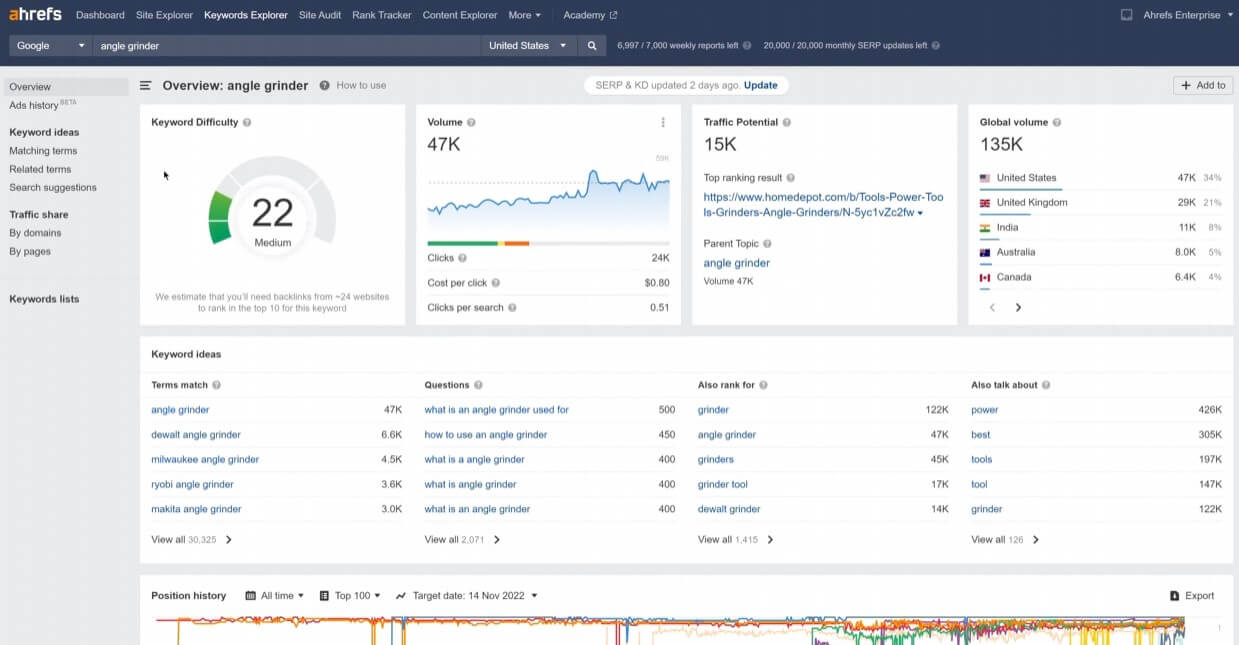 © Ahrefs
© Ahrefs
This lets you see how many clicks you’ll get if you manage to rank for the key phrase. We also discovered many parent topics based on the keywords we provided. In terms of keyword suggestions, Ahrefs is as good as Semrush, with one added category.
Namely, you’ll get the “Also Rank For” tab where you’ll see which keyword you’ll also rank for if you manage to rank for the keyword you’re analyzing. Ahrefs includes the Organic Keywords tool, which lets you discover all ranking keywords on the competitor’s site.
Ahrefs supports keyword clustering like Semrush. This works by providing a seed keyword and obtaining content ideas with corresponding volumes, difficulties, and so on. The SEO tool is suitable for finding long-tail keywords too by applying certain filters.
Semrush is better than Ahrefs for keyword analysis – by a bit, however. We prefer Semrush’s graphics that display all data perfectly clean. Besides, the Intent metric is valuable too, especially when targeting a specific audience.
Backlink Analysis & Link Building
Semrush is an amazing tool for link building and so is Ahrefs. It’ll be interesting to see who comes out on top. Their backlink databases are pretty similar on paper but in this Semrush vs Ahrefs comparison, the former surprisingly lost by quite a margin.
After analyzing our (gizmodo.com) backlink profile, Semrush displayed 287K referring domains and 63.3M backlinks. In comparison, Ahrefs came up with 144K referring domains and 21M backlinks. That’s a stark difference.
| Referring Domains | Total Backlinks | |
| Semrush | 287 K | 63.3 M |
| Ahrefs | 144 K | 21 M |
Semrush’s backlink database has grown significantly since the last time we checked. Ahrefs used to be about on par with it but as you see, things have changed.
Ahrefs
Ahrefs’ Site Explorer tool is frequently used for backlink analysis. It’s great for analyzing your competition in terms of its backlink profile, paid traffic, and organic keywords. You’ll find info like domain rating, URL rating, external links, linked domains, etc.
We love its Ads Position History part where you’ll see which keywords your competitors are buying and ranking for. In the Linked Domain menu, you’ll find more about the external links of your competitors to observe their linking patterns for additional information.
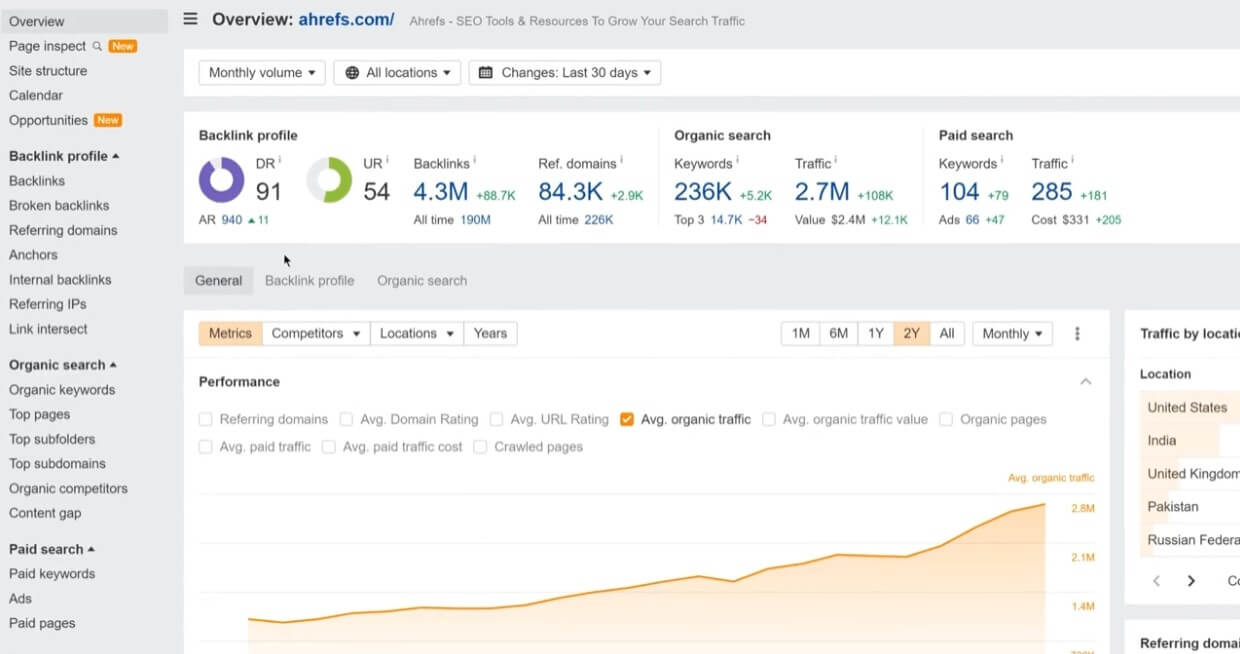 © Ahrefs
© Ahrefs
Another benefit is discovering broken backlinks, which can also influence your Google ranking. Finding broken backlinks makes them easier to resolve, and thus, prevents any harm to your SEO. It’s worth noting that Ahrefs lacks several tools available in Semrush.
These include a dedicated link-building tool and more in-depth backlink audits that could improve the backlink profile more effectively. In terms of data delivery, Ahrefs’ clear interface doesn’t disappoint and all relevant data will be there in seconds.
However, as you’ll see, Semrush is better than Ahrefs for link-building and backlink analysis.
Semrush
Speaking of that, everything we said about Ahrefs applies to this tool. However, Semrush still provides a few more bits of data and its accuracy is superior. The Authority Score is an important metric but there’s also the Authority Score Trend that Ahrefs lacks.
It displays how the website’s authority shifted historically, in the last 12 months. You’ll also easily find new and lost backlinks and referring domains of the website. Ahrefs lacks a dedicated backlink audit tool, which Semrush luckily has.
Find backlink opportunities with Semrush
It evaluates your backlink profile to find toxic links and various backlink-related problems to fix right away. However, it also displays a non-toxic link to let you know what you did good. The highlight of its backlink features is the link-building tool – a splendid addition.
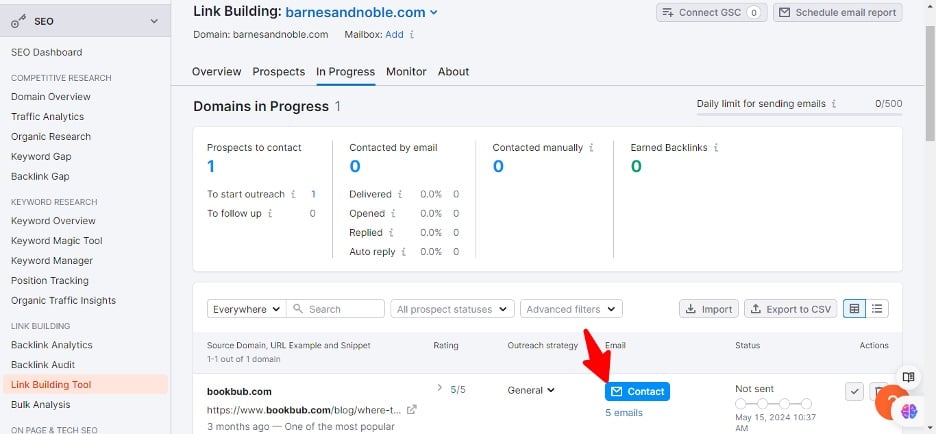 © Gizmodo.com
© Gizmodo.com
Semrush gives you a CRM-like overview of the so-called prospects that represent your backlink opportunities. These are websites that you can contact directly through Semrush and request a backlink or even a guest post to further skyrocket your ranking.
Each prospect can be monitored or removed from the list if you don’t want it. We also found its Product Review option to be excellent. If you have a product you’d like reviewed, contact the website and hand over the product for review – this is a great SEO tactic.
Rank Tracking: Ahrefs or Semrush?
Ahrefs and Semrush are incredible rank trackers that you’ll surely enjoy. However, our team enjoyed the latter more. Once you get a hold of the rank-tracking tool, provide a few keywords, select the country, and you’re all set.
Semrush and Ahrefs will churn out information akin to other great rank trackers. These include ranking distribution, the number of keywords in the top 3 to top 100 results, average position, estimated traffic, and so on. There are glaring differences, though.
Ahrefs
Ahrefs’ rank tracker is a bit… basic. But accurate. After testing it, we found its visibility average position, and traffic metric to be spot-on compared to Semrush. Moreover, it includes the ability to see SERP features and fluctuations in rankings.
Its rank tracker is developed majestically, with easy-to-read information about ranking progress and share of voice, to discover the percentage of organic clicks that end up on your website. Ahrefs supports Google Search Console integration.
![]() © Ahrefs
© Ahrefs
Once you integrate it, you’ll see more data directly from Google, like total impressions, average CTR, total clicks, and your average position. This can be done directly from Ahrefs, so there’s no need to open GSC separately. Quite a handy little thing.
Ahrefs is better than Semrush in terms of tracked keywords. Namely, its cheapest plan tracks 750, while Semrush tracks only 500 keywords. There’s a catch – Ahrefs updates its ranking information WEEKLY, which means its accuracy is, after all, not that great.
Daily updates are possible but only if you shell out an additional $100 per month.
Semrush
Semrush updates rank-tracking info daily and notifies you of rank changes by email. In comparison, tracking only 500 keywords in the cheapest plan sounds a bit underwhelming. We won’t repeat what we said already because its rank tracker works the same.
Track your rankings with Semrush
Even the information you get is very similar. However, Semrush includes cannibalization reports, which we always found welcome. Cannibalization is when two or more pages rank for the same keywords, so they “eat” each other and ruin their rankings.
![]() © Semrush
© Semrush
You can check that by clicking on “Cannibalization” but only if you have the Guru plan. In this Ahrefs vs Semrush analysis, the latter also locks some things behind the paywall. Luckily, Semrush comes with more information about positive and negative impact keywords.
This metric shows you which keywords improved your SEO and which impacted it negatively. You’ll also be able to check the website visibility by locations, alas, only in the Guru plan. Semrush’s most expensive plan tracks 5,000 keywords, while Ahrefs offers 10,000.
It’s hard to decide who is a winner here, Semrush or Ahrefs. The latter tracks more keywords but has weekly updates. Worse yet, the price for daily updates goes up to $250/mo the more expensive your plan is. Semrush tracks fewer keywords but locks some crucial metrics behind the Guru plan.
That means this round of the battle is a tie.
Site Audits (Technical SEO)
Now, we’re getting into technical SEO. Which one to choose, Ahrefs or Semrush?
Well, both tools have excellent site audits that highlight pressing issues and provide ways to resolve them. Semrush is a bit quicker for page crawling but that’s a marginal difference.
The point is that Semrush’s interface looks a tad better, so everything is more readable. there’s a site health score that displays the overall “state” of your website. You’ll see errors, warnings, and notices right away. Errors must be fixed and are highlighted in red.
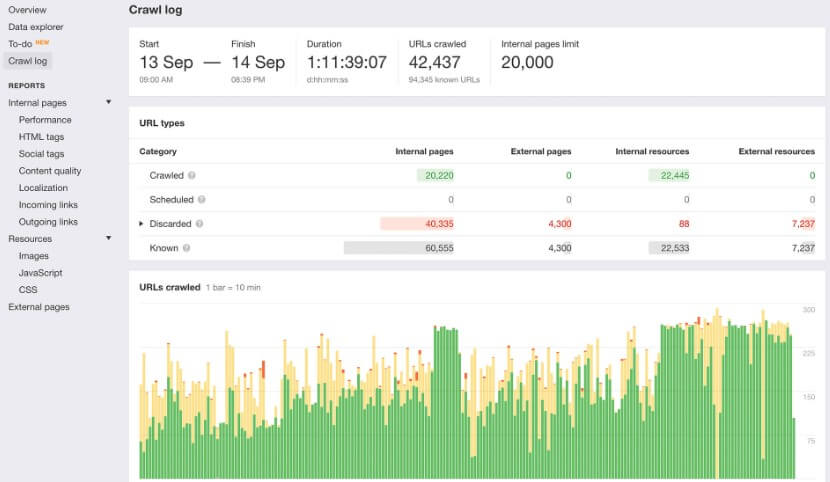 © Ahrefs
© Ahrefs
Semrush lets you click on each error, explore its root cause, and be advised on how to fix it. In addition, parameters like site performance, crawlability, and core web vitals are there. The last one highlights how fast your website is, similar to Google Search Console.
In our Semrush test, we highlighted how effective it was in this regard. It even analyzes your internal link distribution as another important metric. Ahrefs performed the same, detecting issues like slower loading times, non-indexed pages, and others.
Visit Semrush website
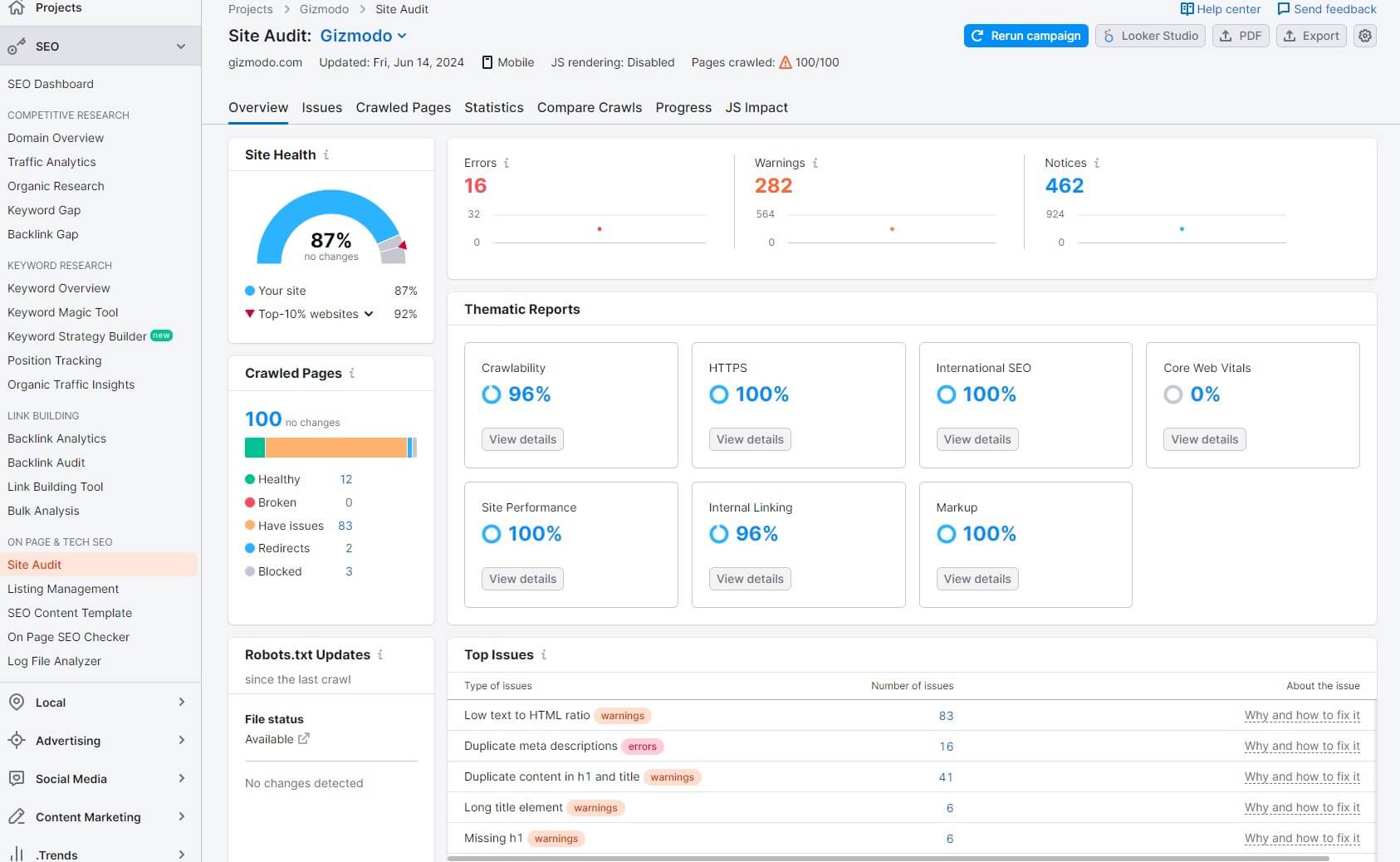 © Semrush
© Semrush
In addition, it includes the Structure Explorer tool that Semrush lacks. We used it to analyze how “distant” other pages to your home page are. This affects the UX negatively because the visitor will need lots of digging from your home page to find the specific page.
You want to have the most important pages easily accessible from the home page, which Ahrefs’ Structure Explorer aims to help with.
On-Page SEO Checker
Semrush comes with its on-page SEO checker that Ahrefs lacks. In our experience, it’s been useful to detect page-specific problems. This tool goes a step further to include SEO strategy ideas, technical SEO ideas, semantic/content ideas, and SERP feature advice.
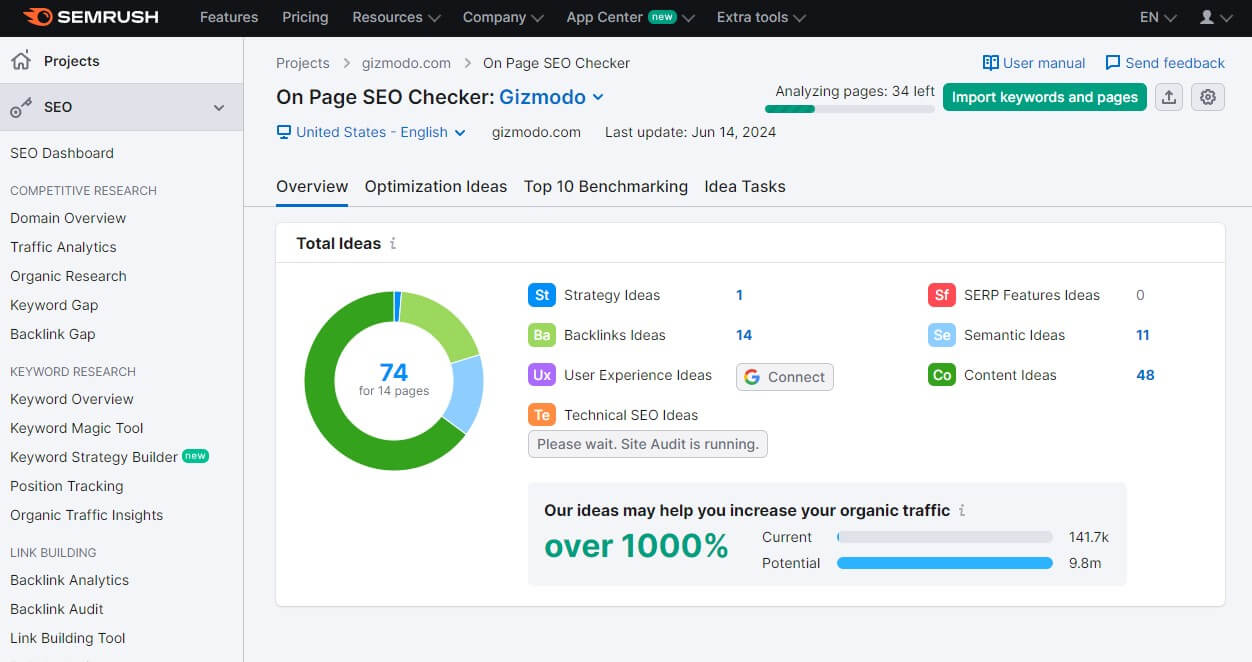 © Semrush
© Semrush
It also displays the page’s potential traffic. The on-page SEO checker also includes the top pages to optimize to achieve more traffic and rank higher. This was a useful metric in many of our analyses. Another notable service that includes on-page SEO tools is SE Ranking.
Content Marketing Features
Content marketing and management was never Ahrefs’ strength and it lacks many features. Its Content Explorer tool is the closest you’ll get to content marketing. It is, however, more suitable for obtaining new topic ideas and analyzing top-performing competitors.
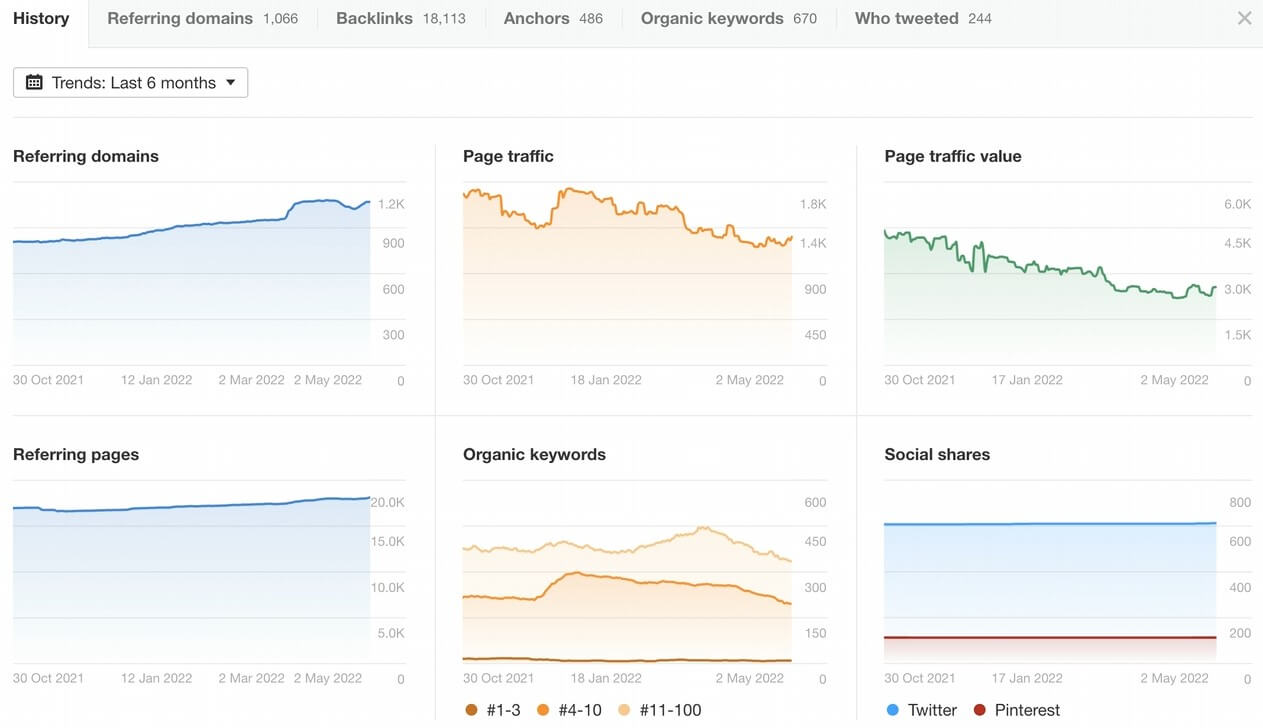 © Ahrefs
© Ahrefs
We don’t say it isn’t good. We used it frequently to find new topics based on the keywords. Ahrefs also displays low-competition topics that you can cover to boost your ranking from the bottom up if your website is new. Semrush can do the same and way more than that.
An example would be the SEO Content Template tool. This tool helps discover LSI keywords and get advice on how long the article should be. Another tool called SEO Writing Assistant is extremely useful. It’s like Grammarly on steroids.
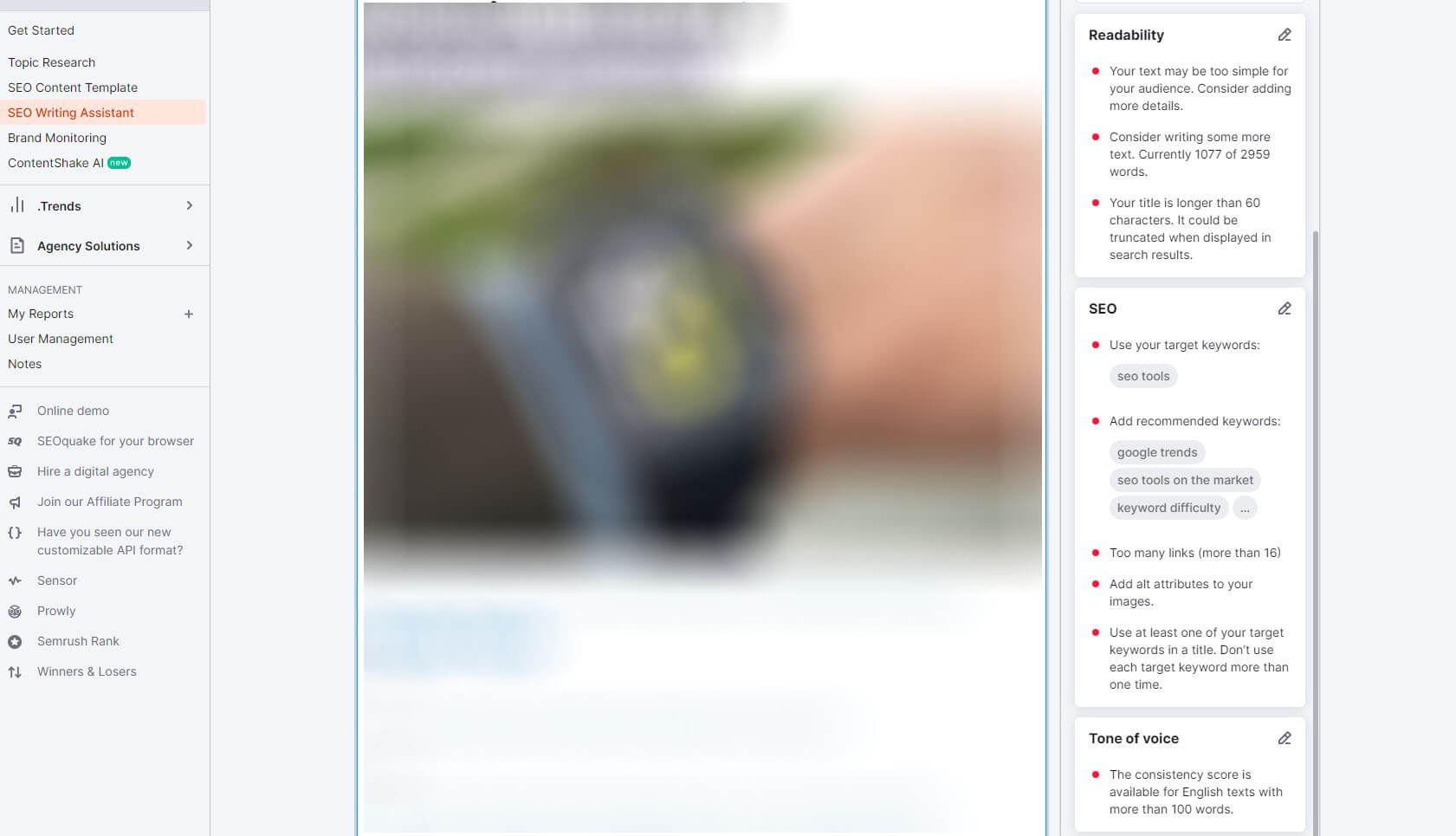 © Semrush
© Semrush
Apart from displaying grammar errors, it includes countless advice on keyword optimization, article structure, and technical SEO issues. Semrush’s Topic Research comes in handy when you have no idea where to go next and want Semrush’s advice on what to focus on.
If you pay a bit more on top, you can use its ContentShake AI. This tool aids article creation through AI that generates text and images while taking care of necessary optimization. Semrush also includes a mighty App Center where you’ll find tons of useful apps.
All of these apps will boost Semrush’s capabilities not only in terms of content marketing but in other aspects as well. This means Semrush is ahead of Ahrefs when it comes to content optimization, creation, and generation in our comparison.
Try Semrush Now
Semrush vs Ahrefs Price Comparison
We can’t complete this Ahrefs vs Semrush comparison without discussing their prices. As these are some of the best SEO tools you can buy, don’t expect them to be cheap or free. However, it’s good to know that Semrush has a free plan while Ahrefs doesn’t.
Ahrefs relies on 10+ free but basic SEO tools that you can delve into without registering. Semrush’s free plan mimics the premium experience but with limited requests – about 10 daily and only a few tracked keywords. Okay, so what about the price?
Ahrefs
Ahrefs’ cheapest plan sounds and looks the same as Semrush’s equivalent. In our experience, this plan lacks some necessary features and won’t be the best solution for more demanding users. No wonder some people see Semrush as an alternative to Ahrefs.
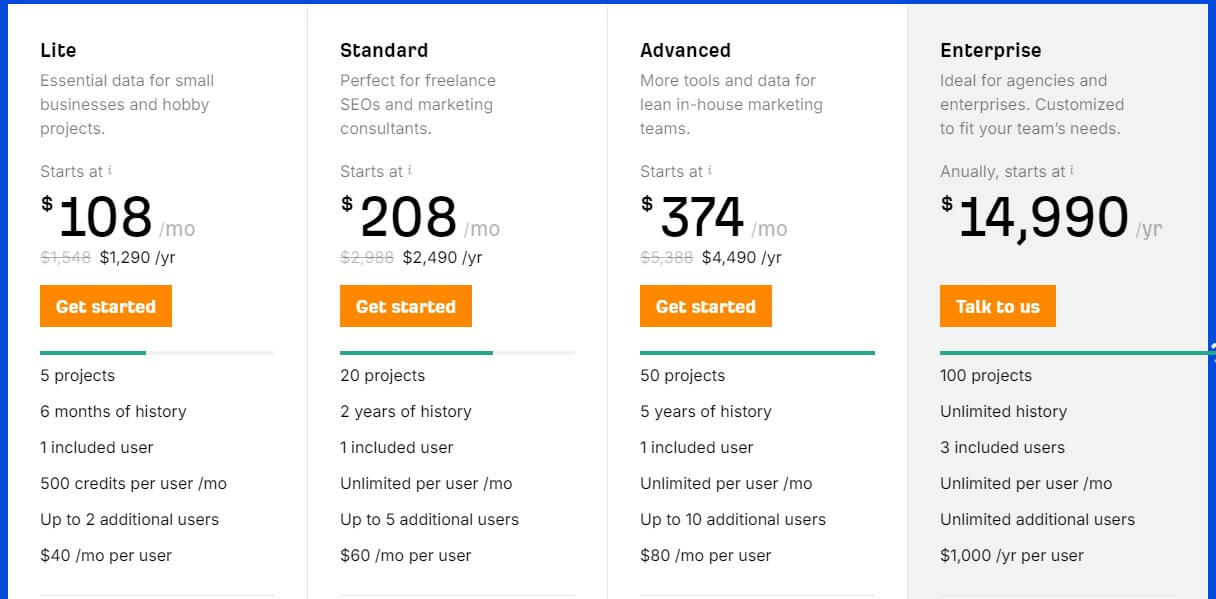 © Ahrefs
© Ahrefs
The problem with Ahrefs is its credit system. It plagues the experience by increasing the cost of the service with the usage. To simplify things, the service charges you 1 credit for every action – opening a report, for example. The cheapest plan comes with 500 credits.
This translates to 500 monthly actions, after which, you’re screwed. You can buy more credits if you run dry but again, that costs more – 500 credits for $50. The Standard plan offers unlimited credits but costs $208 a month or way over $2,400 a year. You at least get 2 free months on top of each annual plan.
Do you want daily rank tracker updates too? Well, that’s an additional $1,200 annually. Ahrefs has no free trial either, so your decision to buy it must be rock-solid. If not… well, imagine your revolt if you end up not liking it. Poor you.
Semrush
Semrush’s price isn’t perfect by any means. The Basic plan at $108.33 a month for the annual plan isn’t the cheapest either. However, there are no credits and you can open reports and do whatever you want without errors. Granted, this plan tracks 500 words, less than Ahrefs.
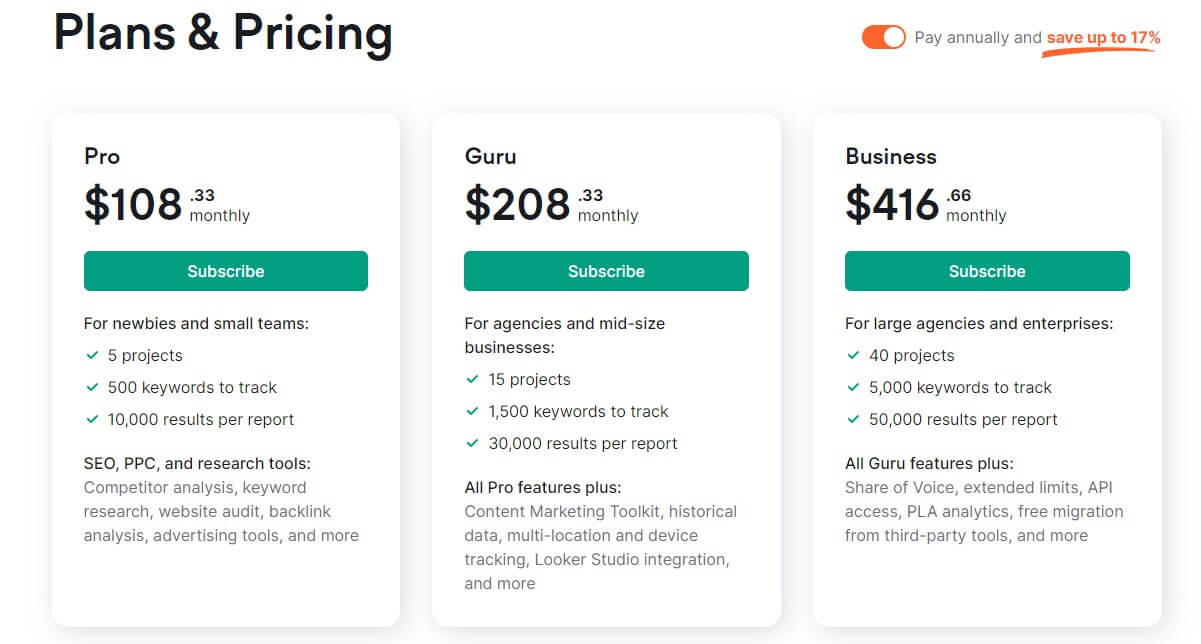 © Semrush
© Semrush
On the other hand, Semrush’s Basic plan still includes many features we mentioned in this Ahrefs vs Semrush comparison. On top of that, Semrush has a coupon that grants you a 17% discount for annual plans and you get a 14-day free trial, so you pay nothing at the start.
The downside of this service is that all plans are for single users. If you want additional users, you’ll have to pay at least $40 for each, which can easily bump up the price. The Guru plan is Semrush’s magnum opus and likely the best possible choice to get everything you want.
Get the best Semrush deal
At just over $200, it’s a far better choice than Ahrefs’ Standard plan. The service includes many optional extras that will undoubtedly cost more. We discussed them in our review of Semrush. So, value-wise, we think this is a better pick.
Considering it won most of the categories of our Semrush vs Ahrefs duel, yet, it’s priced relatively similarly, our opinion is justified. Ahrefs’ value is brought down by a sudden price increase through the credit system and the lack of a free plan/free trial.
Customer Support
We have nothing to complain about on the customer support front. Both support teams are helpful and will be there for you when things go south. Honestly, things won’t go south unless you’re confused or don’t get around their apps well.
If this happens, live chat support will pick you up. Use the live chat widget, provide your email/username, and ask the question. Both services have amazing response times of just around a minute and they’re more than helpful in resolving pressing matters.
On-site support is fantastic. Both tools offer how-to guides, FAQs, and other self-help means. A pretty nice experience on both sides.
Conclusion: Semrush Is Better Than Ahrefs
Everything we said so far led us to this conclusion and the opinion that Semrush beats Ahrefs. Now, this isn’t a knockout by any means because Ahrefs punches back in many categories too. Both tools are almost neck-and-neck but Semrush often has an edge by offering slightly more data and features.
We discovered it provides more accurate backlink information. It’s also a solid tool for keyword research because of the Keyword Magic Tool. However, Ahrefs and its keyword suggestions were more than useful. Other categories mostly belong to Semrush.
Site audits, link building, and even content marketing are more streamlined in Semrush too. Ultimately, we can’t say you’ll go wrong with Ahrefs. Millions of users who enjoy it wouldn’t agree with us. In our experience, Semrush is a tad better at the end of the day.
If you want to test it without losing money, let us remind you of its 14-day free trial. Additionally, users who aim for a long-term commitment will be granted a 17% price reduction for any of the three annual plans, right after the free trial period ends.
Try Semrush Risk-Free Now


![11 Best YouTube Keyword Tools to Increase Rankings [2024] 11 Best YouTube Keyword Tools to Increase Rankings [2024]](https://virtual-coach.com/wp-content/uploads/2024/07/10_Best_YouTube_Keyword_Tools-360x270.jpg)
